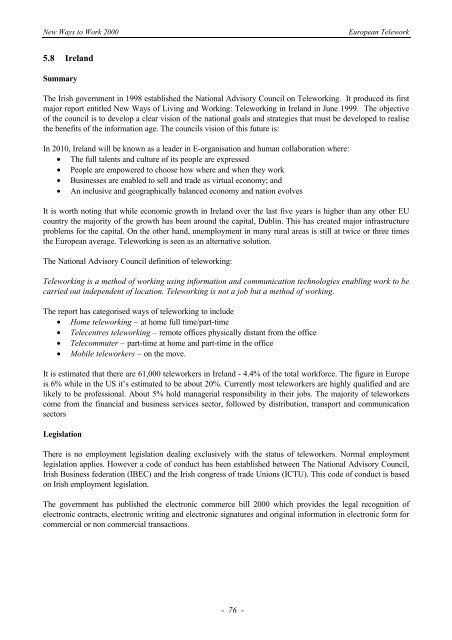eWORK 2000 - European Telework Week
eWORK 2000 - European Telework Week
eWORK 2000 - European Telework Week
- No tags were found...
Create successful ePaper yourself
Turn your PDF publications into a flip-book with our unique Google optimized e-Paper software.
New Ways to Work <strong>2000</strong><strong>European</strong> <strong>Telework</strong>5.8 IrelandSummaryThe Irish government in 1998 established the National Advisory Council on <strong>Telework</strong>ing. It produced its firstmajor report entitled New Ways of Living and Working: <strong>Telework</strong>ing in Ireland in June 1999. The objectiveof the council is to develop a clear vision of the national goals and strategies that must be developed to realisethe benefits of the information age. The councils vision of this future is:In 2010, Ireland will be known as a leader in E-organisation and human collaboration where:• The full talents and culture of its people are expressed• People are empowered to choose how where and when they work• Businesses are enabled to sell and trade as virtual economy; and• An inclusive and geographically balanced economy and nation evolvesIt is worth noting that while economic growth in Ireland over the last five years is higher than any other EUcountry the majority of the growth has been around the capital, Dublin. This has created major infrastructureproblems for the capital. On the other hand, unemployment in many rural areas is still at twice or three timesthe <strong>European</strong> average. <strong>Telework</strong>ing is seen as an alternative solution.The National Advisory Council definition of teleworking:<strong>Telework</strong>ing is a method of working using information and communication technologies enabling work to becarried out independent of location. <strong>Telework</strong>ing is not a job but a method of working.The report has categorised ways of teleworking to include• Home teleworking – at home full time/part-time• Telecentres teleworking – remote offices physically distant from the office• Telecommuter – part-time at home and part-time in the office• Mobile teleworkers – on the move.It is estimated that there are 61,000 teleworkers in Ireland - 4.4% of the total workforce. The figure in Europeis 6% while in the US it’s estimated to be about 20%. Currently most teleworkers are highly qualified and arelikely to be professional. About 5% hold managerial responsibility in their jobs. The majority of teleworkerscome from the financial and business services sector, followed by distribution, transport and communicationsectorsLegislationThere is no employment legislation dealing exclusively with the status of teleworkers. Normal employmentlegislation applies. However a code of conduct has been established between The National Advisory Council,Irish Business federation (IBEC) and the Irish congress of trade Unions (ICTU). This code of conduct is basedon Irish employment legislation.The government has published the electronic commerce bill <strong>2000</strong> which provides the legal recognition ofelectronic contracts, electronic writing and electronic signatures and original information in electronic form forcommercial or non commercial transactions.- 76 -








